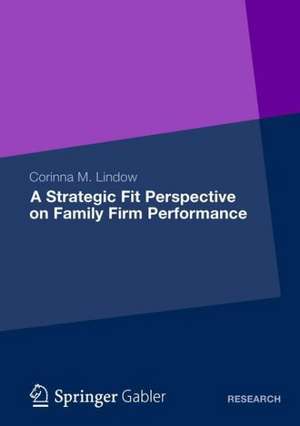A Strategic Fit Perspective on Family Firm Performance
Autor Corinna M. Lindowen Limba Engleză Paperback – 11 sep 2012
Preț: 385.25 lei
Nou
Puncte Express: 578
Preț estimativ în valută:
73.73€ • 76.77$ • 62.31£
73.73€ • 76.77$ • 62.31£
Carte tipărită la comandă
Livrare economică 10-24 martie
Preluare comenzi: 021 569.72.76
Specificații
ISBN-13: 9783834933560
ISBN-10: 3834933562
Pagini: 336
Ilustrații: XIX, 270 p. 34 illus.
Dimensiuni: 148 x 210 x 15 mm
Greutate: 0.35 kg
Ediția:2013
Editura: Springer Fachmedien Wiesbaden
Colecția Springer Gabler
Locul publicării:Wiesbaden, Germany
ISBN-10: 3834933562
Pagini: 336
Ilustrații: XIX, 270 p. 34 illus.
Dimensiuni: 148 x 210 x 15 mm
Greutate: 0.35 kg
Ediția:2013
Editura: Springer Fachmedien Wiesbaden
Colecția Springer Gabler
Locul publicării:Wiesbaden, Germany
Public țintă
ResearchCuprins
Family firms as research objects.- Literature review on family firm performance research.- A strategic fit perspective on family firm performance.- Empirical analyses regarding the association between family influence, strategic fit, and firm performance
Notă biografică
Dr. Corinna Lindow completed her dissertation at the Chair of Strategic Management and Organization at HHL - Leipzig Graduate School of Management (Germany) and at the Cox Family Enterprise Center of the Kennesaw State University (USA).
Textul de pe ultima copertă
Corinna M. Lindow substantiates, develops, and tests a strategic fit perspective on family firm performance in order to contribute to explaining previous inconclusive findings. In particular, she aims at investigating whether strategic fit determines family firm performance and what role family influence plays. Based on a sample of German family firms, the author indicates that, against expectations, family firms’ performance is not driven by strategic fit but through the effective use of family-specific factors such as family business governance and family culture. Further, the results suggest that family influence has important implications for strategy, organizational structure, and the achievement of strategic fit.
Caracteristici
Includes supplementary material: sn.pub/extras










